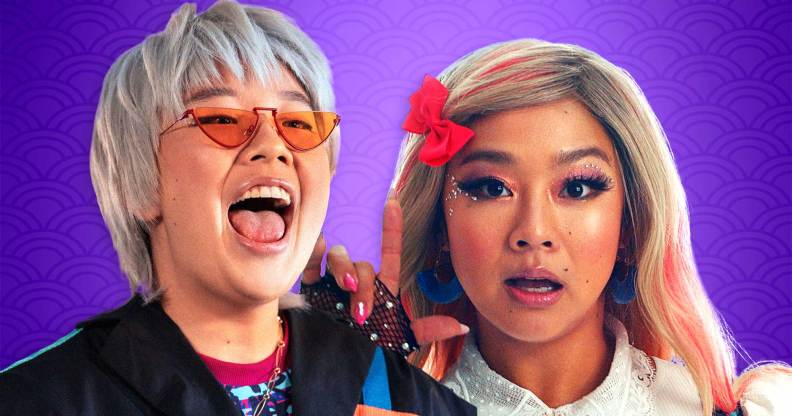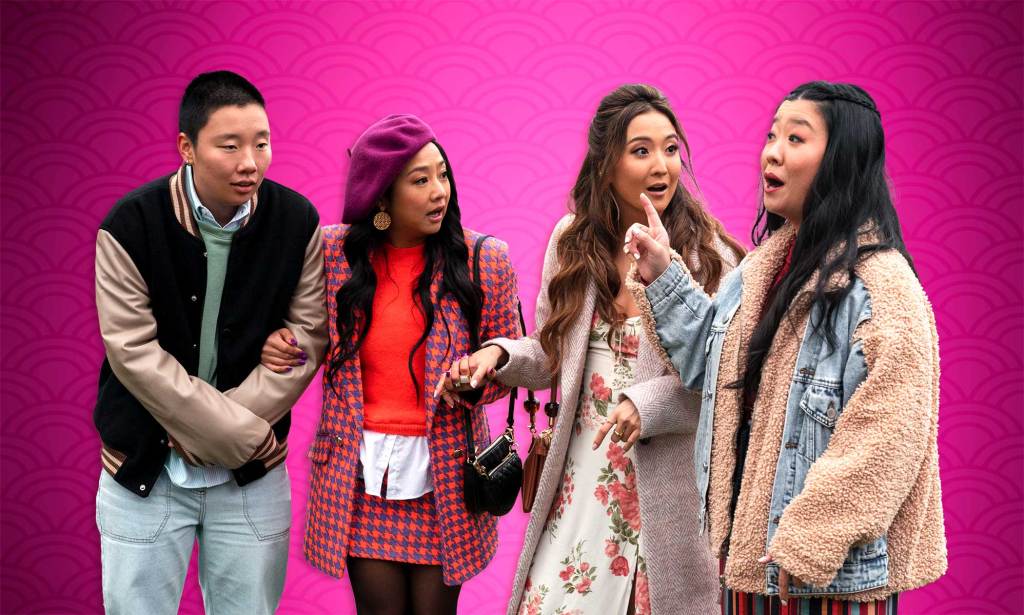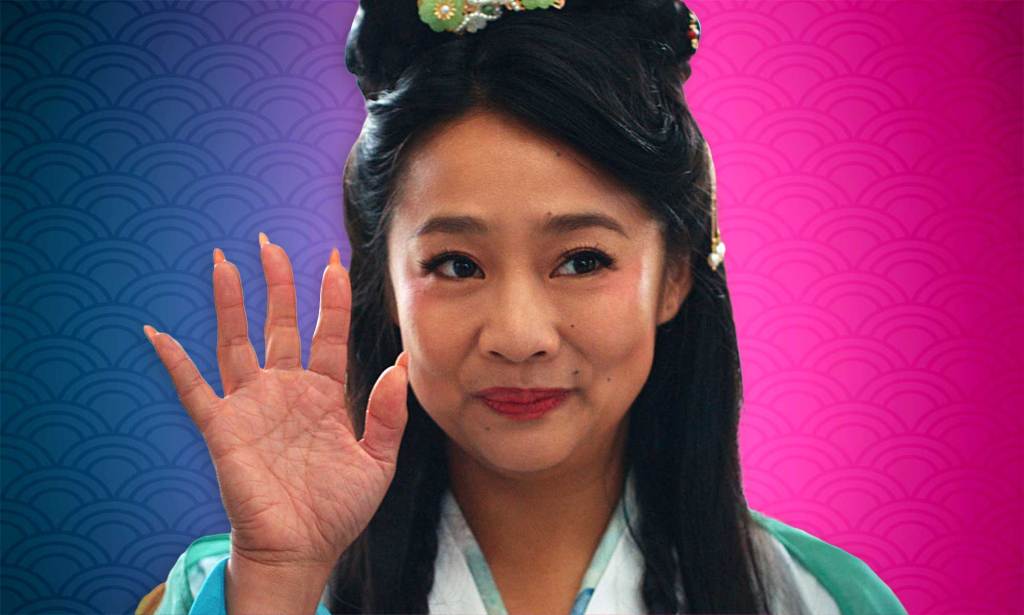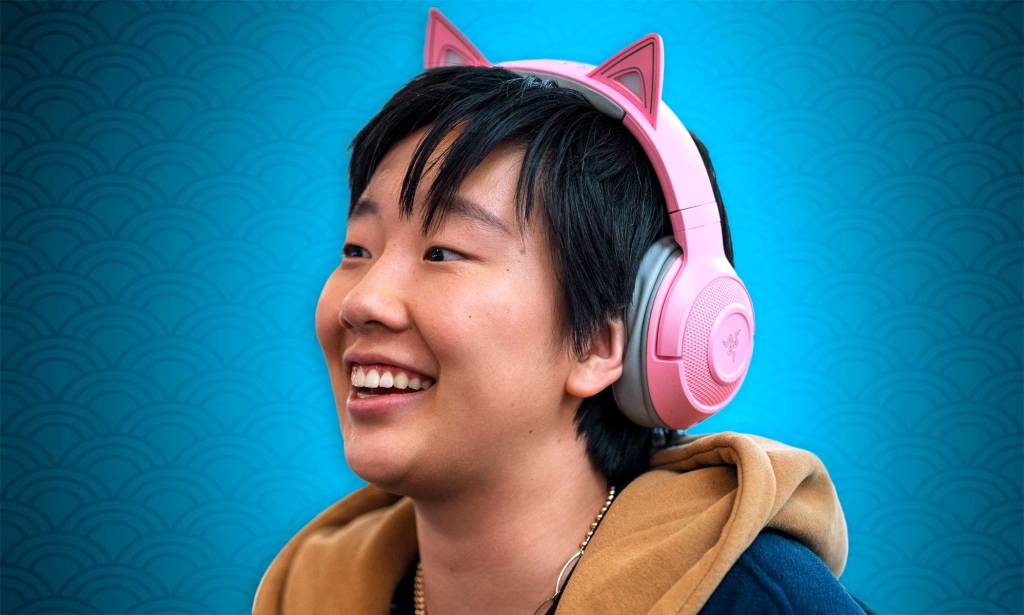Stephanie Hsu and Sabrina Wu on Joy Ride, queerness and the power of finding chosen family

Joy Ride stars Stephanie Hsu and Sabrina Wu discuss queerness, chosen family and how their raunchy new comedy breaks the mould.
The stars of Joy Ride tells Christobel Hastings about queer identity, chosen family and how their raunchy new comedy breaks the mould.
There’s a recipe for comedies such as The Hangover and Bridesmaids, and it goes something like this: a group of three to four unlikely friends set out on a road trip, only to have their holiday derailed by a series of debauched shenanigans. Throw in gross-out humour, explicit sex scenes and a heartfelt journey of self-discovery, and you’ve all the makings of a box-office hit.
But Joy Ride isn’t quite like anything we’ve seen on the big screen before, not least because the road-tripping leads aren’t white men.
Directed by Crazy Rich Asians screenwriter Adele Lim, the globe-trotting adventure follows Audrey (Ashley Park), an ambitious Asian American woman raised by white adoptive parents, as she travels to Beijing on a high-stakes business trip. Alongside her childhood best friend and sex positive artist Lolo (Sherry Cola), Lolo’s cousin and K-pop enthusiast, Deadeye (Sabrina Wu), and college-roommate-turned-soap-opera-star Kat (Stephanie Hsu), the trip quickly goes off the rails when Audrey has to track down her birth mother in order to seal a business deal.

As a film with the working title of Joy F*ck Club might suggest, this is an unapologetic raunch-fest, keen to prove that Asian women can be as messy, ridiculous and thirsty as the best of them. The award for the horniest of the characters, however, goes to Kat, an actress who is desperately attempting to hide her promiscuous past from her devoutly religious fiancé. Try as she might to keep her libido in check, she somehow ends up in all kinds of outrageous situations, including shattering a man’s pelvis during an impromptu sex act with a basketball and a Theragun, and scandalising a crowd of K-pop fans (and later, the entire internet) by accidentally revealing a NSFW devil tattoo.
“It was really fun to enter a character who so cared about her persona, because she was hiding a wild secret about herself,” says Hsu when we speak ahead of the release of Joy Ride.
The film represents new territory for the 32-year-old, who earned an Oscar nomination for best supporting actress after her ground-breaking performance as the many-faced villain Joy Wang/Jobu Tupaki in Everything Everywhere All at Once.
Perhaps it shouldn’t come as too much of a surprise that she was game for explicit scenes, after all, she began her career in experimental theatre and comedy, and as a university freshman, she sang songs about safe sex and condoms. “That’s always fun to kind of stretch yourself in the completely, seemingly opposite direction,” she grins.
‘I was so grateful that there was space for me to add creative decisions to this character that made me feel seen’
In the film, Kat goes to great lengths to pretend she’s a good Christian girl saving herself for marriage, before realising that there is little point concealing her sexual history if she wants to be truly accepted. Hsu, on the other hand, says she’s always sought to show up authentically.
“To a fault, I try to be overly authentic,” she says. “Specifically in the public eye, it feels really important to me, Stephanie, as a person. It feels strange to fake anything. So, Kat and I are really different in that way. She pauses for a moment. “I think there has been a part of me that’s always prided myself on not being, like, an ‘actor’, actor. You know? I’m like, you know, but I’m cool and I care about other things. And if my hair is messy, so what?”
If Everything Everywhere marked Hsu as one of the most promising talents in Hollywood, then Joy Ride is certain to do the same for non-binary star Wu, who uses they/them pronouns. One of Variety‘s 10 new comics to watch, the stand-up’s only previous Hollywood job was as a writer on Disney+’s Doogie Kameāloha, M.D. – a reboot of Doogie Howser, the 80s TV show that catapulted Neil Patrick Harris to fame.

From the moment they received the script, though, they knew the film was “going to be huge”, so much so that they were compelled to do more than 100 takes for their audition. “It was an absurd number,” Wu says wryly. “That being said, it was, like, the first script I’d ever been sent to audition for. So, I was like: ‘Oh, I need to do this well, so that one, I can get money, and two, my agents won’t drop me’. I was so afraid they would never send me another audition if I didn’t do a good job.”
Wu says it was a huge honour to be picked to play Deadeye, who is also non-binary, even though the script was markedly different from when they first auditioned for the role. “It wasn’t necessarily going to be the case”, they recall. “It was able to happen because the creator saw me and what I was bringing to this character, and a big part of acting is interpreting the text”. Wu points to a hilarious scene where Kat meets Deadeye for the first time. “My legal name is Vanessa – call me Deadeye,” they intone, fixing her with a stony expression.
‘It was only my close circle of friends who knew I was non-binary, and it only happened because they really saw me for who I was’
“You’re like, why does a person want to do that? Why is this person not fitting in?” says Wu. “It made a ton of sense to me that they would be sort of gender-non-conforming because their lines didn’t read as a cis woman to me”. The significance of being able to mould their character isn’t lost on them. “I was so grateful that there was space for me to add creative decisions to this character that made me feel seen, and I think made the movie itself much better and richer.”
Although Joy Ride pushes the boundaries in the way it gives its four Asian characters – three women and one non-binary person – permission to be unapologetically raunchy, the addition of queer identities also elevates it in the representation stakes.
With bawdy jokes about “peen and vagine” and a scene in which Kat and Lolo build sexual tension as they slap each other as part of a drinking game, queerness is very apparent in the film, which makes sense, given that both Hsu and Cola identify as queer in real life. And while there isn’t an explicitly queer storyline, Hsu recently revealed that Joy Ride had a “whole gay track” between Lolo and Kat that was cut – news that would surely upset queer viewers, were it not for the fact that the story will now be saved for a sequel.

While each character goes on their own emotional journey, it’s Deadeye who’s at the heart of the film. Initially perceived as an oddball, it soon becomes apparent that they’re a sweet soul who’s simply misunderstood by the world around them. As they finally find the friendships they’ve been searching for for their whole life, they come to a fresh understanding about who they are.
“There is a very subtle arc with Deadeye, where they change their pronouns at the end,” says Wu. “And, in my mind, it sort of paralleled a lot of what was going on in [mine]. It was only my close circle of friends who knew I was non-binary, and it only happened because they really saw me for who I was.”
That moment of representation is important, not least because it’s so understated. In Joy Ride, there are no big “coming out” moments, but the hints of queerness will undoubtedly resonate with the LGBTQ+ community. “In my family life, there was so much like: ‘You’re straight, you’re a girl, and actually, you should be a lawyer’,” says Wu, who uses non-binary and transmasc interchangeably.
It was a different story during production, where they found plenty of support from their co-stars while figuring out their identity. “When we were filming, there were so many questions like: ‘How do you see Deadeye?’ And Stephanie being like: ‘Yo, Sabrina, I think you’re trans’. It was happening on a meta level.” As well as being able to turn up as their full self on set, Wu says, they also experienced the authenticity and connection that many members of the LGBTQ+ community find in chosen family.
“The special thing about chosen families [is that] they help you really discover who you are,” says Wu. “You can’t really see yourself and find your people until you know who you are, but you can’t know who you are until you find your people. I felt that so intensely throughout this project.” Serendipitous, too, since Joy Ride is as much about connecting with your past, as it is about making peace with yourself in the present.
“I hope it’s reflected,” Wu continues. “Like, it’s really weird: Deadeye is kind of going through that, and I, Sabrina, was going through that, not that we’re the same people at all. I hope the queer community likes that story.”
‘We are a chosen family of sorts and that’s kind of what gets you through the hard times’
As a queer, Asian-American woman who inhabits multiple identities, Hsu also feels fortunate to have been able to forge strong connections throughout her career. “I think growing up within not only the Asian community, or the theatre community or the queer community, I feel my whole life I’ve been discovering chosen family, and friendship is such a lifeline for me,” she says.
That collaborative spirit evidently drives her, and, one year on from Everything Everywhere, she’s grateful to have found a meaningful connection again with the co-stars and creative team on Joy Ride.
“I’m grateful that the four of us [Park, Wu and Cola] and the creatives, including our producers, have that sense of camaraderie and true collaboration and love for one another,” she adds. “Because making a movie is a form of creative birthing, but also trauma bonding. We are a chosen family of sorts and that’s kind of what gets you through the hard times.”
Joy Ride is in UK cinemas now.
How did this story make you feel?

